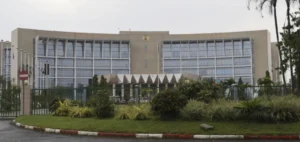Opec+ countries agreed on Monday to cut production to support prices in the face of recession fears, the first time they have done so in more than a year and the drastic cuts made due to the Covid-19 pandemic.
Representatives of the thirteen members of the Organization of the Petroleum Exporting Countries (Opec) and their ten allies have agreed to “return to the August quotas”, a drop of 100,000 barrels compared to September, the Vienna-based alliance announced in a statement.
The group, which met by videoconference, left the door open for further discussions before the next meeting on October 5, “to respond if necessary to market developments.
At its monthly meetings, OPEC+ resists Western calls to open its valves wider in order to contain soaring prices and inflation at its highest level in decades.
Buoyed by the news, prices of the two global crude references were up more than 3% to $96.40 a barrel of North Sea Brent and $89.80 a barrel of WTI around 12:50 GMT (14:50 in Vienna).
Caution
“This symbolic drop is not a real surprise after the murmurings of the past few weeks,” reacted Caroline Bain, an analyst at Capital Economics, in a note.
The Saudi Minister of Energy, Abdelaziz bin Salmane, seemed to open the door, ten days ago, to the possibility of a cut, denouncing a market “fallen into a vicious circle of low liquidity and extreme volatility.
Affected by an increasingly gloomy global economic outlook, prices had fallen for the third consecutive month in August, far from their highs near $140 a barrel.
“Better a stop now. Better to be overly cautious,” says Bjarne Schieldrop, an analyst at Seb, in explaining the Opec+ decision.
The alliance “clearly wants to maintain the high prices” that provide it with lucrative revenues, adds Oanda analyst Craig Erlam.
In addition, “it may fear that the return of Iranian crude to the market will tip the market balance in favor of supply and thus lower prices,” he adds.
Hopes for an agreement, which would be accompanied by an easing of US sanctions, particularly on oil, have recently been revived.
Before a new cold shower in these endless talks: the United States said Thursday that Tehran’s response to the text submitted by the European Union was “unfortunately (…) not constructive.
Question of “credibility”.
Another factor is the inability of Opec+ to meet its targets.
“Current production and quotas are now disconnected, so it’s a question of credibility,” Schieldrop stresses.
Political crises of long duration, or lack of investment and maintenance during the pandemic, are now handicapping the oil infrastructure: many countries in the group, such as Angola or Nigeria, cannot pump more, appearing to be already at maximum capacity.
Only Saudi Arabia and the United Arab Emirates appear to have spare production capacity. It is also a new message to the West, which is trying to contain inflation at all costs.
The latest announcement, the seven most industrialized countries decided Friday to “urgently” cap the price of Russian oil, to limit the resources that Moscow derives from the sale of hydrocarbons. But Russia has warned that it will no longer sell oil to countries adopting this unprecedented mechanism.
The supply on the market could then be reduced, which would contribute to a new surge in prices which, despite the recent downturn, remain historically high and extremely volatile.






















